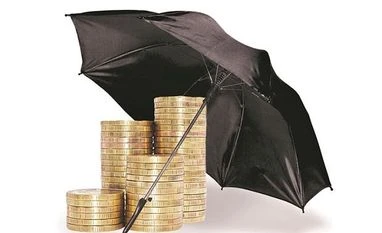Hitherto, they get a tax benefit on dividend income received on a policy holder’s investments. As a result, their effective tax rate was lower than the 14 per cent corporate tax. With dividend income no longer tax-exempt, product margins will get impacted and EV will take a one-time hit, observes a note by brokerage Jefferies.
Dividend income holds a significant share in the profit before tax of a life insurance company, of 24-37 per cent in 2018-19, it is estimated.
“According to the sensitivity analysis disclosed by insurance companies, the change in tax rate to 25 per cent (from about 14 per cent currently) negatively impacts the value of new business in the range of 8-20 per cent, while EV would see an impact in the range of 4-12 per cent. However, this might still not throw colour on the actual impact, as dividend income would have been taken as tax-free under these sensitivity tables,” goes a note from Motilal Oswal Financial Services.
The change in Section 80M of the income tax law—which now allows a company to avail of deduction to the extent of dividend received or distributed, whichever is less—can offset the increase in tax outgo of the insurers.
“Dividends will be taxed at the corporate tax rate in the hands of the recipient, instead of the earlier Dividend Distribution Tax (DDT). However, the modification of section 80M would mean that dividend income received from the equity portfolio would be tax-exempt to the extent of dividend distributed to domestic corporate shareholders,” said Mandeep Mehta, deputy chief financial officer at Max Life Insurance.
The amount of dividend income, he added, would depend on an insurer’s equity assets. “Players with a significant portion of equity in their AUM (assets under management) might have a higher component of dividend in their income. To avail of the full dividend income exemption under Section 80M, dividend outgo to domestic companies should be at least equal to dividend income,” he said.
Experts say dividend payout will depend on an insurer’s policy in this regard, growth in equity investment and the amount it wants to plough back into its business.
“As a statistic, the effective tax rate for life insurance companies may increase due to the withdrawal of exemption under Section 10(34) but it is equally hoped that they get higher dividend in their hands. Since life companies are taxed at a lower rate, they will potentially have higher cash flows, which should be a benefit for them,” said Anish Thacker, partner at consultants EY India.
Some reckon general insurers could emerge worse off than life insurers. "The proposed dividend taxation regime will benefit life insurance companies, owing to such dividends being taxable at a concessional rate of 14.3 per cent as opposed to being subject to an effective dividend distribution tax at 17.05 per cent (on a gross basis). Claiming the deduction under Section 80M through onward distribution of dividends to its shareholders would further go on to reduce the tax liability. Similarly, savings are likely to accrue on income distribution from non-equity oriented mutual fund investments. On the other hand, general insurance companies, being taxable at the basic corporate rate of 25-30 per cent, are likely to be worse off,” said Jay Mehta, partner, PwC India.
Apart from DDT, insurers' business will also take a hit because of the removal of exemptions and deductions under Section 80C for investors opting for the new income tax regime. An assessee opting for the new regime will not be eligible for tax benefits on insurance premium paid during a year.
To read the full story, Subscribe Now at just Rs 249 a month
Already a subscriber? Log in
Subscribe To BS Premium
₹249
Renews automatically
₹1699₹1999
Opt for auto renewal and save Rs. 300 Renews automatically
₹1999
What you get on BS Premium?
-
Unlock 30+ premium stories daily hand-picked by our editors, across devices on browser and app.
-
Pick your 5 favourite companies, get a daily email with all news updates on them.
Full access to our intuitive epaper - clip, save, share articles from any device; newspaper archives from 2006.
Preferential invites to Business Standard events.
Curated newsletters on markets, personal finance, policy & politics, start-ups, technology, and more.
Need More Information - write to us at assist@bsmail.in
)